be动词及助动词的一般疑问句专题
- 格式:docx
- 大小:14.32 KB
- 文档页数:7
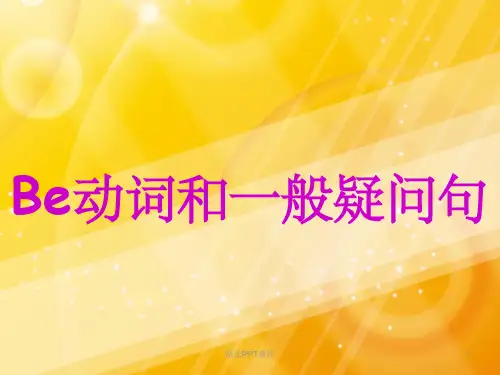
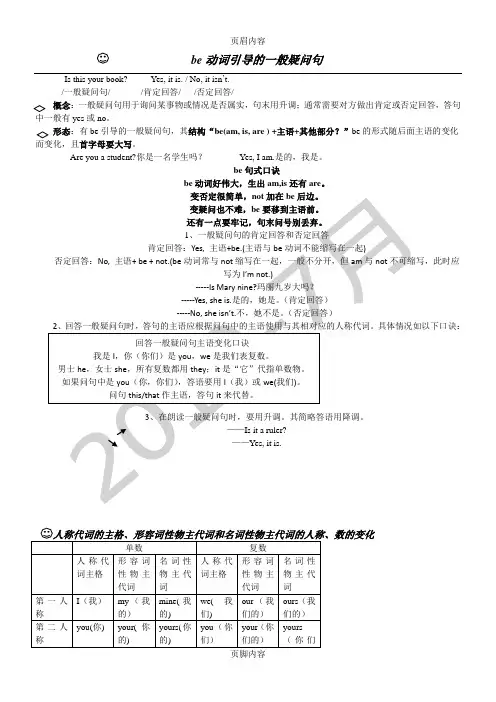
be 动词引导的一般疑问句
----Is this your book? -----Yes, it is. / No, it isn ’t. /一般疑问句/ /肯定回答/ /否定回答/
概念:一般疑问句用于询问某事物或情况是否属实,句末用升调;通常需要对方做出肯定或否定回答,答句中一般有yes 或no 。
形态:有be 引导的一般疑问句,其结构“be(am, is, are ) +主语+其他部分?”be 的形式随后面主语的变化而变化,且首字母要大写。
------Are you a student?你是一名学生吗? -------Yes, I am.是的,我是。
be 句式口诀
be 动词好伟大,生出am,is 还有are 。
人称代词主格
1、用法:人称代词的主格在句中作主语。
He is a boy.
2、人称代词并列作主语时,其顺序为:第二人称 第三人称 第一人称
(2)等
1
2形物代变名物代,掌握规律变得快。
多数词尾加-s ,my, its, his 要除外。
my 把y 来变成i , 接着再把ne 带。
his, its 不用变,词形一样莫奇怪。
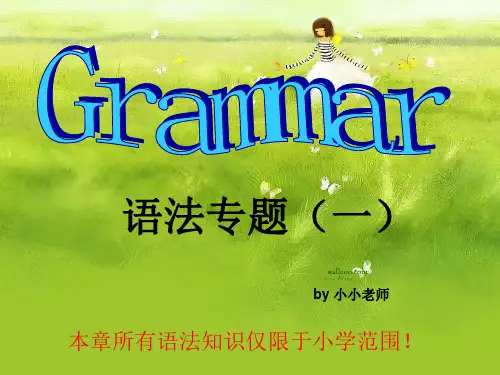
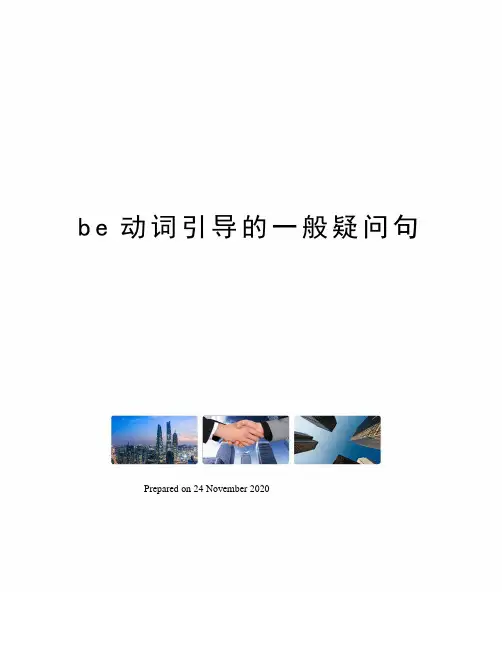
b e动词引导的一般疑问句 Prepared on 24 November 2020be 动词引导的一般疑问句----Is this your book -----Yes, it is. / No, it isn ’t. /一般疑问句/ /肯定回答/ /否定回答/概念:一般疑问句用于询问某事物或情况是否属实,句末用升调;通常需要对方做出肯定或否定回答,答句中一般有yes 或no 。
形态:有be 引导的一般疑问句,其结构“be(am, is, are ) +主语+其他部分”be 的形式随后面主语的变化而变化,且首字母要大写。
------Are you a student 你是一名学生吗 -------Yes, I am.是的,我是。
be 句式口诀be 动词好伟大,生出am,is 还有are 。
变否定很简单,not 加在be 后边。
变疑问也不难,be 要移到主语前。
还有一点要牢记,句末问号别丢弃。
1、一般疑问句的肯定回答和否定回答肯定回答:Yes, 主语+be.(主语与be 动词不能缩写在一起)否定回答:No, 主语+ be + not.(be动词常与not缩写在一起,一般不分开,但am与not不可缩写,此时应写为I’m not.) -----Is Mary nine玛丽九岁大吗-----Yes, she is.是的,她是。
(肯定回答)-----No, she isn’t.不,她不是。
(否定回答)2、回答一般疑问句时,答句的主语应根据问句中的主语使用与其相对应的人称代词。
具体情况如以下口诀:称、数的变化人称代词主格1、用法:人称代词的主格在句中作主语。
He is a boy.2、人称代词并列作主语时,其顺序为:第二人称 第三人称 第一人称You, she and I are in the same class. He and I are good friends.3、复数人称代词并列做主语时,其顺序为:第一人称 第二人称第三人称We, you and they are Yong Pioneers. 我们、你们和他们都是少先队员。
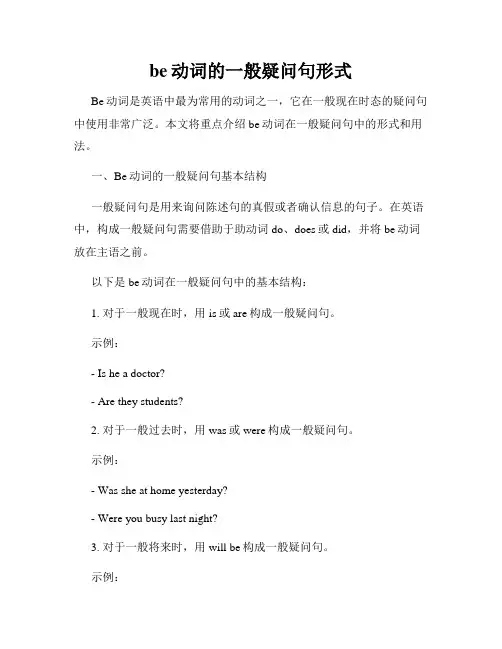
be动词的一般疑问句形式Be动词是英语中最为常用的动词之一,它在一般现在时态的疑问句中使用非常广泛。
本文将重点介绍be动词在一般疑问句中的形式和用法。
一、Be动词的一般疑问句基本结构一般疑问句是用来询问陈述句的真假或者确认信息的句子。
在英语中,构成一般疑问句需要借助于助动词do、does或did,并将be动词放在主语之前。
以下是be动词在一般疑问句中的基本结构:1. 对于一般现在时,用is或are构成一般疑问句。
示例:- Is he a doctor?- Are they students?2. 对于一般过去时,用was或were构成一般疑问句。
示例:- Was she at home yesterday?- Were you busy last night?3. 对于一般将来时,用will be构成一般疑问句。
示例:- Will it be cold tomorrow?- Will they be here next week?二、Be动词一般疑问句的回答形式针对be动词的一般疑问句,回答可以使用肯定回答或否定回答,具体形式如下:1. 肯定回答:将be动词直接与主语保持一致。
示例:- Is he a doctor? - Yes, he is.- Are they students? - Yes, they are.2. 否定回答:将be动词直接否定,并添加not。
示例:- Is he a doctor? - No, he is not.- Are they students? - No, they are not.需要注意的是,对于缩略形式的回答,“Yes, he is.” 可以缩写为“Yes, he's.”,“No, he is not.” 可以缩写为“No, he isn't.”三、Be动词一般疑问句的变位规则在一般疑问句中,根据句子主语的人称和数的不同,be动词及助动词do的变位也会相应改变。
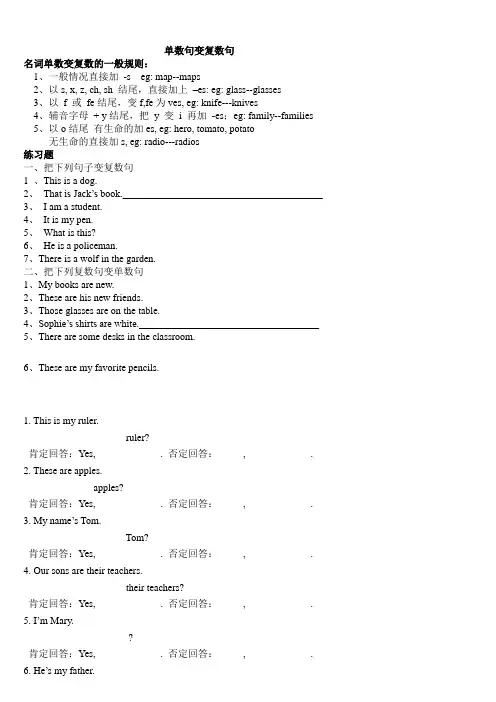
单数句变复数句名词单数变复数的一般规则:1、一般情况直接加-s eg: map--maps2、以s, x, z, ch, sh 结尾,直接加上–es: eg: glass--glasses3、以 f 或fe结尾,变f,fe为ves, eg: knife---knives4、辅音字母+ y结尾,把y 变i 再加-es;eg: family--families5、以o结尾有生命的加es, eg: hero, tomato, potato无生命的直接加s, eg: radio---radios练习题一、把下列句子变复数句1 、This is a dog.___________________________________________2、That is Jack’s book.________________________________________3、I am a student._________________________________________4、It is my pen.______________________________________________5、What is this?_____________________________________________6、He is a policeman._________________________________________7、There is a wolf in the garden._________________________________二、把下列复数句变单数句1、My books are new. ________________________________________2、These are his new friends.__________________________________3、Those glasses are on the table._______________________________4、Sophie’s shirts are white.____________________________________5、There are some desks in the classroom.________________________________________________________ 6、These are my favorite pencils.________________________________1. This is my ruler.______ ______ ______ ruler?肯定回答:Yes, ______ ______. 否定回答:_____, ______ ______. 2. These are apples.______ ______ apples?肯定回答:Yes, ______ ______. 否定回答:_____, ______ ______. 3. My name’s Tom.______ ______ ______ Tom?肯定回答:Yes, ______ ______. 否定回答:_____, ______ ______. 4. Our sons are their teachers.______ ______ ______ their teachers?肯定回答:Yes, ______ ______. 否定回答:_____, ______ ______. 5. I’m Mary.______ ______ _______?肯定回答:Yes, ______ ______. 否定回答:_____, ______ ______.______ ______ ______ father?肯定回答:Yes, ______ ______. 否定回答:_____, ______ ______.7. She is my mother.______ ______ ______ mother?肯定回答:Yes, ______ ______. 否定回答:_____, ______ ______.8. We’re good friends.______ ______ good friends?肯定回答:Yes, ______ ______. 否定回答:_____, ______ ______.9. That’s an egg.______ ______ _______ _______?肯定回答:Yes, ______ ______. 否定回答:_____, ______ ______.10. Those are our cups.______ ______ ______ _______?肯定回答:Yes, ______ ______. 否定回答:_____, ______ ______.11. It’s mine.______ ______ ______?肯定回答:Yes, ______ ______. 否定回答:_____, ______ ______.12. They are ours.______ ______ ______?肯定回答:Yes, ______ ______. 否定回答:_____, ______ ______.13. I have a basketball.______ ______ ______ a basketball?肯定回答:Yes, ______ ______. 否定回答:_____, ______ ______.14. He has a tennis racket.______ ______ ______a tennis racket?肯定回答:Yes, ______ ______. 否定回答:_____, ______ ______.15. We have some friends in China.______ ______ ______ _______ friends in China?肯定回答:Yes, ______ ______. 否定回答:_____, ______ ______.16. They have many books.______ ______ ______ many books?肯定回答:Yes, ______ ______. 否定回答:_____, ______ ______.17. I like English.______ ______ ______ English?肯定回答:Yes, ______ ______. 否定回答:_____, ______ ______.18. He likes apples.______ ______ ______ apples?19. Tom likes playing basketball.______ ______ ______ playing basketball?肯定回答:Yes, ______ ______. 否定回答:_____, ______ ______.20. My father likes strawberries.______ ______ father ______ strawberries?肯定回答:Yes, ______ ______. 否定回答:_____, ______ ______.21. We like our friends.______ ______ ______ ______ friends?肯定回答:Yes, ______ ______. 否定回答:_____, ______ ______.22. She watches TV every day.______ ______ ______ TV every day?肯定回答:Yes, ______ ______. 否定回答:_____, ______ ______.23. I watch TV every day.______ ______ ______TV every day?肯定回答:Yes, ______ ______. 否定回答:_____, ______ ______.24. He plays basketball in the afternoon.______ ______ ______ basketball in the afternoon?肯定回答:Yes, ______ ______. 否定回答:_____, ______ ______.25. Tom goes to school in the morning.______ ______ ______ to school in the morning?肯定回答:Yes, ______ ______. 否定回答:_____, ______ ______.26. I want to be fat.______ ______ ______ ______ ______ fat?肯定回答:Yes, ______ ______. 否定回答:_____, ______ ______.27. He wants to play computer games.______ ______ ______ ______ ______ computer games?肯定回答:Yes, ______ ______. 否定回答:_____, ______ ______.28. He often does homework at home.______ ______ often ______ homework at home?肯定回答:Yes, ______ ______. 否定回答:_____, ______ ______.29. My mother loves bananas.______ ______ mother ______ _______?助动词do、does练习题一、用括号里的词的适当形式填空I (like) We (want) They (watch) My parents (do)He (play) She (watch) Lucy (fish) Bob (study) Tom (know) My uncle (go) His sister (do) Mike (cry) Eric (have)二、将下列句子变成否定句和一般疑问句(13579作肯定回答,246810作否定回答)1. I have a soccer ball.2. She has a ping-pong bat.3. My parents like vegetables.4. He likes eating eggs for breakfast.5. They watch football games on TV.6. Mary’s brother watches DVDs at home.7. Mike and Bill do their homework. 8. Emma does her homework on time. 9. We go home at half past five. 10. My sister goes to school at seven.。

be 动词引导的一般疑问句
----Is this your book? -----Yes, it is. / No, it isn ’t. /一般疑问句/ /肯定回答/ /否定回答/
概念:一般疑问句用于询问某事物或情况是否属实,句末用升调;通常需要对方做出肯定或否定回答,答句中一般有yes 或no 。
形态:有be 引导的一般疑问句,其结构“be(am, is, are ) +主语+其他部分?”be 的形式随后面主语的变化而变化,且首字母要大写。
------Are you a student?你是一名学生吗? -------Yes, I am.是的,我是。
be 句式口诀
be 动词好伟大,生出am,is 还有are 。
人称代词主格
1、用法:人称代词的主格在句中作主语。
He is a boy.
2、人称代词并列作主语时,其顺序为:第二人称 第三人称 第一人称
(2)等
1
2形物代变名物代,掌握规律变得快。
多数词尾加-s ,my, its, his 要除外。
my 把y 来变成i , 接着再把ne 带。
his, its 不用变,词形一样莫奇怪。
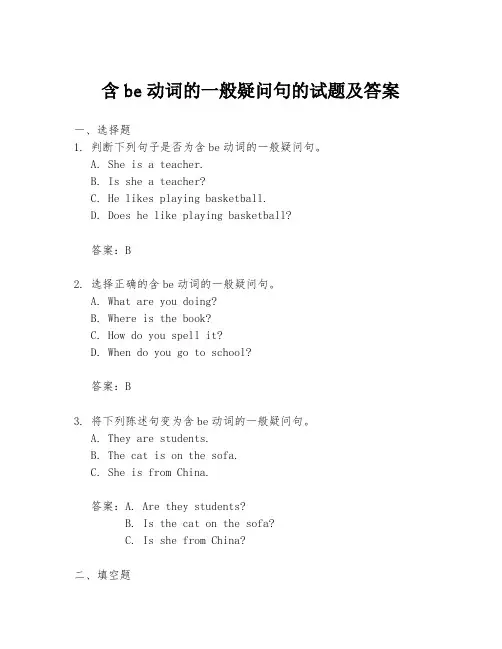
含be动词的一般疑问句的试题及答案一、选择题1. 判断下列句子是否为含be动词的一般疑问句。
A. She is a teacher.B. Is she a teacher?C. He likes playing basketball.D. Does he like playing basketball?答案:B2. 选择正确的含be动词的一般疑问句。
A. What are you doing?B. Where is the book?C. How do you spell it?D. When do you go to school?答案:B3. 将下列陈述句变为含be动词的一般疑问句。
A. They are students.B. The cat is on the sofa.C. She is from China.答案:A. Are they students?B. Is the cat on the sofa?C. Is she from China?二、填空题4. 完成下列句子,使其成为含be动词的一般疑问句。
A. ________ you a student?B. ________ the dog under the table?C. ________ they at home?答案:A. AreB. IsC. Are5. 根据所给信息,填写正确的be动词。
A. ________ (I) a teacher?B. ________ (you) from England?C. ________ (it) a sunny day?答案:A. AmB. AreC. Is三、改错题6. 改正下列句子中的错误,使其成为正确的含be动词的一般疑问句。
A. She is a teacher. (Is she a teacher?)B. The book is on the desk. (Is the book on the desk?)C. They are from Japan. (Are they from Japan?)答案:A. Is she a teacher?B. Is the book on the desk?C. Are they from Japan?四、翻译题7. 将下列中文句子翻译为含be动词的一般疑问句。
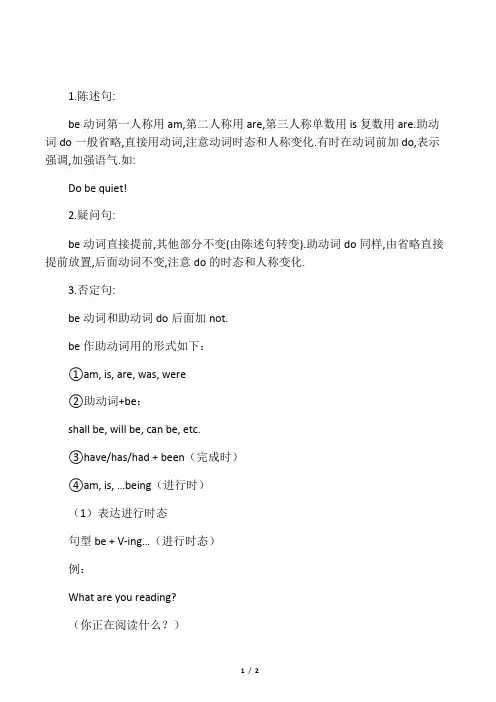
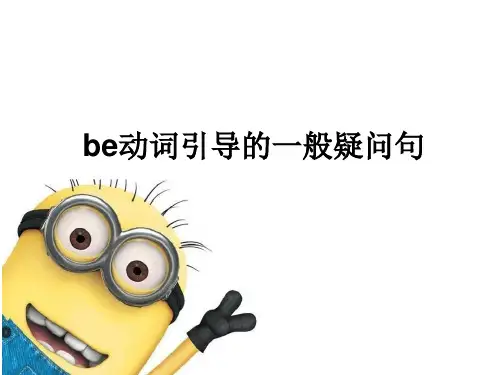
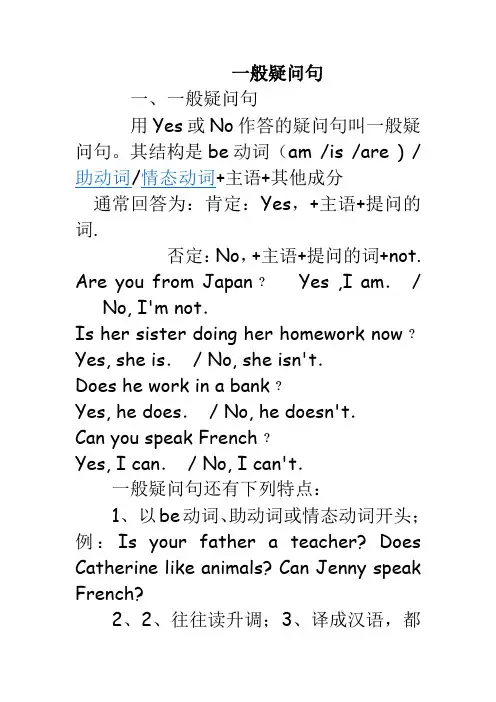
一般疑问句一、一般疑问句用Yes或No作答的疑问句叫一般疑问句。
其结构是be动词(am /is /are ) /主语+其他成分Yes,+主语+提问的词.否定:No,+主语+提问的词+not. Are you from Japan﹖Yes ,I am./ No, I'm not.Is her sister doing her homework now﹖Yes, she is./ No, she isn't.Does he work in a bank﹖Yes, he does./ No, he doesn't.Can you speak French﹖Yes, I can./ No, I can't.一般疑问句还有下列特点:1、以be动词、助动词或情态动词开头;例:Is your father a teacher? Does Catherine like animals? Can Jenny speak French?2、2、往往读升调;3、译成汉语,都能够带上“吗”,例如上面三句可分别译为:你父亲是老师吗?凯瑟琳喜欢动物吗?詹妮会说法语吗?二、例何将陈述句变成一般疑问句?要将陈述句变成一般疑问句,能够遵循下列步骤:1.am、is、are、was、were can、may、must …)时,可直接将它们提到句首,句末打上问号即可。
主语为第一人称,应将其改为第二人称。
例:It was rainy yesterday.→Was it rainy yesterday?Tom's father can play the piano.→Can Tom's father play the piano?I have finished my homework.→Have you finished your homework?2.如果句中没有be动词或情态动词,则根据谓语动词的形式借助do的相对应形式放在句首。
一般疑问句一、一般疑问句有两种:一种是由be动词引起的疑问句,另一种是由助动词或情态动词引起的疑问句,此处要讲前一种。
1.含有be动词的一般疑问句的构成。
be动词引起的一般疑问句的构成是在肯定句的基础上将be动词(am ,is,are)移至主语之前,这时be动词已在句首,第一个字母应大写,句末用问号。
2.一般疑问句的答语。
肯定回答为“Yes,主语+ am/is/are.”;否定回答为“No,主语+ am/is/are + not.”。
—Are you twelve?你十二岁吗?—Yes, I am.是的,我是。
/No, I’m not.不,我不是。
注意:不可以写成“Yes,I’m.”或“No,I amn’t.”。
3.如何变一般疑问句“一调”是把be动词提至主语前;“二变”是原主语及be动词首字母大小写和人称的改变;“三问号”是句末用问号,读成升调。
(注意第一人称)二、练习对一般疑问句进行回答。
1.—Are you eight?—Yes,. /No,.2.—Am I in Class Four?—Yes,./No,.3.—Are they students?—Yes,./No,.4.—Is that her cup?—Yes,./No,.5.—Is he Eric?—Yes,. /No,.6.Are these pencils Anna’s?(做肯定回答)7.Are those pencils Bob’s?(做否定回答)将陈述句变为一般疑问句。
8.This is her ruler. ___________________________9.Those are your books.10.I am Tom.11.These are Lily’s pens.12.This is an eraser. ___________________________13.That is a Chinese book. __________________________14.(济南中考)She is good at playing the piano (钢琴).good at playing the piano?15.(临沂中考)There are some flowers (花) in the garden (花园).any flowers in the garden?。
be动词、助动词、情态动词讲解 (基础篇)1、be动词的用法。
英语中,be动词选用单数还是复数,要由主语来定,主语是单数,就用单数,反之用复数。
◆句中含有be动词时:肯定句:主语+be +其他否定句:主语+ be + not +其他一般疑问句: Be +主语+其他+?特殊疑问句:疑问词(what / who / when / where)+ be +主语+其他+?I am a teacher. You are right.She is 16 years old. My father is at home.The students are playing games. My teacher was ill yesterday.There is a picture on the wall.There are two books on the table.★ be动词用法歌:我用am,你用are,is 连接他她它。
单数名词用is,复数名词全用are。
变疑问,往前提,句末问号莫丢弃;变否定,更容易,be后not莫忘记;疑问否定任你变,句首大写莫迟疑。
★ be动词作谓语,它后面一般跟名词、形容词或介词短语。
她个子很高。
她在教室里。
她是一个高个子的女孩。
2、助动词的用法。
英语句子按正常语序是“什么人或事物” + “做什么”,即,我们常说的“主语 + 谓语 + 其他”。
①主语为I 或复数名词、代词时:肯定句: I / We / They / The students +动词原形+其他+。
We watch TV every night.变否定:主语+ don’t +动词原形+其他+。
We don’t watch TV every night.一般疑问句 Do + 主语 + 动词原形 + 其他 + ?Do you watch TV every night?Yes, we do. / No, we don’t.特殊疑问句:疑问词 + do + 主语 + 动词原形 + 其他 + ?1How often do you watch TV?②主语为单数名词或代词时:肯定句:主语 + 动词第三人称单数形式 + 其他 + 。
一般疑问句用yes或no回答的疑问句,称为一般疑问句,这种疑问句句末语调多用升调,句末用问号“?”句型:Be动词+ 主语+ ......?●A: Am I wrong again? (我又错了?)B: Yes, you are (wrong again). (是的,你又错了。
B: No, you aren’t. (不,你没错。
)●A: Is it your bicycle? (这辆自行车是你的吗?)B: Yes, it is. (是的,是我的。
)B: No, it isn’t. (不,那不是我的。
)●A: Are you a student? (你是学生吗?)B:Yes, I am. (是的,我是。
)B: No, I’m not. / No, I am not. (不,我不是。
)●A: Is there any drinks in the fridge?B: Yes, there is. (是的,有。
)B: No, there isn’t. (不,没有。
)●A: Are there any birds in the sky? (天空中有鸟吗?)B: Yes, there are. (是的,有。
)B: No, there aren’t. (不,没有。
)陈述句中有情态动词时,可以直接将它们提前到主语前,构成一般疑问句。
句型:情态动词+ 主语+ 动词原形+ ......?●A: Can you bring me some cakes? (你能给我拿些蛋糕来吗?)B: Yes, I can. (是的,可以。
)B: No, I can’t. / No, I cannot. (不,不可以。
)●A: Must I do it now? (我必须现在做吗?)B: Yes, you must. (是的,你必须。
)B: No, you needn’t. (不,你不必。
)(1)情态动词表示请求Can/Could you carry the heavy box for me? (你能帮我提一下这个重箱子吗?)Will/Would you please give me some butter? (你能给我一些黄油吗?)May I have some rice? (我可以吃一些米饭吗?)(2)情态动词表示邀请、建议Will you visit the museum next week? (你下周来参观博物馆好吗?)Would you like to go shopping with us? (你愿意和我们一起逛街购物吗?)Shall we go swimming? (我们一起去游泳好吗?)陈述句中只有行为动词时,一般疑问句要在句首加助动词do / does / did(过去式)句型:Do/Does/Did + 主语+ 动词原形+ ......?●A: Does he have supper at home every day?(他每天都在家吃晚饭吗?)B: Yes, he does. (是的,他是。
一般疑问句用Yes be动词(am /is主语+其他成分主语+提问的词.否定:No,+主语+提问的词+not.Are you from Japan﹖Yes ,I am. / No, I'm not.Is her sister doing her homework now﹖Yes, she is. / No, she isn't.Does he work in a bank﹖Yes, he does. / No, he doesn't.Can you speak French﹖Yes, I can. / No, I can't.一: 般疑问句还有下列特点:1、以be动词、助动词或情态动词开头;例:Is your father a teacher? Does Catherine like animals? Can Jenny speak French?二: 如何将陈述句变成一般疑问句?要将陈述句变成一般疑问句,可以遵循下列步骤:1.如句中有be 动词(am、is、 are、 was、 were can、may、must …)或助动词(do、does、did、 have、 had(完成时中))时,可直接将它们提到句首,句末打上问号即可。
主语为第一人称,应将其改为第二人称。
例: It was rainy yesterday.→Was it rainy yesterday?Tom's father can play the piano.→Can Tom's father play the piano?I have finished my homework.→Have you finished your homework?2.如果句中没有be动词、助动词或情态动词,则根据谓语动词的形式借助do的相应形式放在句首。
具体方法是:如果谓语动词是原形,则借do;如果谓语动词是一般现在时第三人称单数形式,则借does;如果谓语动词是过去式,则借did. 需要注意的是,借does 或did后,原句的谓语动词要变回原形。
be动词,情态动词,助动词do/does的用法区别及练习1. 由连系am is , are构成的句子:变一般疑问句时把am, is , are提到句子的前面,句尾用问号即可。
变否定句时直接在am is,are后面加not即可。
例如:肯定句:He is a student.一般疑问句:Is he a student ?否定句:He is not a student.画线提问:对he提问:Who is a student ?对 a student 提问:What is he or What does he do2. 由情态动词can, may, should 等构成的句子:变一般疑问句时把can,may,提到句子的前面,句尾用问号即可.变否定句时直接在can,may,后面加not即可.例如:肯定句:She can swim.一般疑问句:Can she swim ?否定句:She can not swim.画线提问:对she提问:Who can swim ?对swim 提问:What can she do3. 由行为动词构成的句子:需要加助词do或does.变一般疑问句时把do/does放在句子前面.变否定句时把don' t/doesn ' t放在动词的前面。
要注意观察动词的形式并对号入座。
一般疑问句和否定句的动词三单式都要变回原型。
play——do plays——does例如:肯定句:They play football after school. He plays football after school.一般疑问句:Do they play football after school Does he play football after school ?否定句:They don't (do not) play football after school. He doesn' t' play footballafter school ? footballdesk.( 一般疑问句)after school.画线提问:对 they/he 提问:Who plays football after school 对 play football 提问:What do they do after school What does he do 对 after school 提问:When do they play footballWhen does he play针对性练习 按要求改写句子: know the answer.( —般疑问句)the an swer?can see some birds.( 一般疑问句 )see ___ birds ? desig ns clothes.( 一般疑问句)heclothes ?are some flowers on the teachersflowers on the teachers ' desk ?are some apples on the tree.(否定句)There __________________ apples on the tree. think he is very old.(否定句)I _____ thi nk he _____ very old. colour it green.( 否定句) ____________ colour it gree n. doctors are helpful.(变否定句 )may have some hot dogs.( 一般疑问句 ) aren ' t any pears in the box.( 同义句 ) There are _____ pears in the box.(就划线部分提sig n means “ No smok ing ” .What _____ this sig n _________ ? looks you ng.(改一般疑问句)_______ she _______ young ? is you ng.(改为一般疑问句) _________________________ ? pencils are in th______ 对划线部分提问) ____________ your pen cils ?get up at six every day.(对划线部分提问)______________________ you get up every day ? like to walk home.(改为一般疑问句)_____ they ________________________________ ? are cars.( 用buses 改写成选择疑问句) Are these cars ___________ ? plant is one month old.(就划线部分提问)___________________________ pla nt ? boys are in our house.( 改为 there be 句型) ____________ t wo boys in our house. pla nt has two gree n leaves.________________________________________ pla nt _____ Li goes to Hong Kong by pla ne.(同义句)Miss Li ________________ Hong Kong.22. The wome n work in the shoe factory. ____ (就划线部分提问)____________________ w omen __________is happy, because he is going to take a trip tomorrow. __________father can cook the meals. (就划线部分提问)Not all of us laughed whe n we heard it.None of us laughed whe n we heard it.【注】可能涉及部分否定的词语有both, 非两者都”,not all表示“并非所有的都”,表示“并非每个…都”。
济宁七中初一英语培优学案(2)一般疑问句专题(命题人:刘金凤赵琦审核人:王之箬)班级:____________ 姓名:____________※知识点:概念:一般疑问句是针对一种事物或情况是否属实而提出疑问的句子,回答时一般用yes或no开头作简略回答。
其结构为:Be动词/助动词/情态动词+ 主语+其他成分读时通常用升调(/)★含Be动词的一般疑问句:(1)构成:Be (Am/ls/Are ) + 主语+ 其他成分如: Are you Alice/Is this a map /Are those yourpare nts⑵其肯定及否定回答为:Yes主语+be./No,主语+be not.(3)含有be(am , is, are)动词的陈述句变为一般疑问句时,要:Be动词提前首字母大写句末加问号④注意有无人称转换:第一人称(I, my...)T第二人称(you,your...)例如:This is my ruler.(改为一般疑问句并作肯定及否定回答)Yes, _________ _________ ./No, __________ ★含实义动词(行为动词)的一般疑问句:(1)构成:助动词Do/Does + 主语+实义动词原形+其他成分如: Do you have a soccer ball/Does your brother have a computer /Do they love pin g-p ong⑵其肯定及否定回答为:Yes主语+do/does./No,主语+don'doesn '(3)含实义动词的陈述句变为一般疑问句时,要:句首加Do/Does首字母大写句末加问号④ 注意有无人称转换:第一人称(I,my...)T第二人称(you,your..J例如:I have a tenn is ball.(改为一般疑问句并作肯定及否定回答)_________ _____________ have a tennis ballYes, I _________ ./No,I ____________ .【基础巩固】按要求完成句子,每空一词1. Is this your school bag做否定回答)No, ______________________ . It's ___________ .她的)2. 这些是他的乒乓球吗是的。
__________ ___________ his ping-pong bats No, ___________ 3. Alice的妈妈是英语老师吗不,不是。
__________ Alice's mother an English teacherYes, ___________ 4. ---他有乒乓球吗--- __________ he__________ a ping-pong ball---不,他没有。
但是他有乒乓球拍。
--- __________ , he he _________a ping-pong bat.【技能提升】一、单项选择the white and black bike _____---No, ______ is red and yellow.A. your;my book 'it ;he ;mine 2. ---Is Mr. Gree n your un cle,it is. ,he isn't ,she is ,it isn 'tyour ring _____ the lost and found box,Eric---Yes, _____ .;it 's ;it's ;it is ;this'syour brother _____ a baseball bat;have ;have ;has ;hasyou like playing computer games---No,I don's'very ____ ,I think.A. big---They are books.A. Are these English booksB. Are those English booksC. How do you spell itD. What are these in English7. ---Is _____ mother a teacher---Yes,she is.A. Jim's and Kate 'sand Kate's and Kate's8. ---Does your cousin _____ any baseballs---Yes,he ______ some.9. --- _____ they play tennis after class---No,they don'my friend Eric _________ .;do ;does ;does ;doesn'tAre Sandy and Kate _______ good friends---Yes,they look after(照顾)__________ .A. your;their ;them ;theirs ;them、根据汉语完成句子rin Class 1, Grade 6.(变为一般疑问句)are my parents in the first photo.(变一般疑问句)two boys are my cousi ns.改为一般疑问句,并作肯定及否定回答。
)Yes, _________ __________ . /No, ___________ _____________ has a yellow pencil box .改为一般疑问句,并作肯定及否定回答。
)Yes, _________ __________ . /No, ___________ _____________ 5. 她不是每天都看电视。
She ______________________________ every day.6. 你和你爸爸打乒乓球吗Do you __________ ping-pong ____________ your fatherplays tennis at school every day.对戈U线部分提问)__________ ___________ she play ping-pong every day8. Is this his box改为复数句)、情景交际(其中有两项多余)A:Hello,Mike! _____ 31 ____B:No,it isn's P eter's.A: ____ 32 ____B:He has five.A: ____ 33 ____B:Yes,he often play ping-pong.A:Oh,l like play ing pin g-p ong,B:That soundsA:Yes,I do.Peter like doing sportsis your soccer ballthis your soccer ballyou have a pin g-p ong bat,how many soccer balls does Peter have'this in En glish'play pin g-p ong after school.四、阅读理解Football People call it f he first ”第一)sport in the word ”.There are two teams (队)in the football field duri ng a team has eleve n players.Tennis There is a big net网)in the middle of the court(球场)。
Each player has a racket(球拍)in his or four players can play it together.Golf (高尔夫球)Golf comes from means green,oxygen,light and play it on the outdoor grass草地).They hit(打)the white balls in to the small holes(洞)with a stick(棍子)。
Basketrball America is the hometown (家乡)of sport is famous for are two teams with ten players on the basketball can't run with the ball in their hands.26. The first sport in the world is ______ .A. basketball27. _______ is a very popular sport in America.A. Basketball28. People use a stick to hit the white sport is _____________ .A. football29. There are ______ players in a football game.30. People needn't run in the ______ game.A. football培训心得。